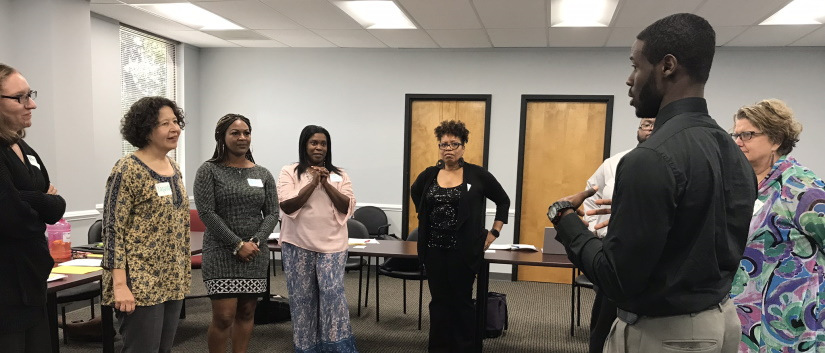May 12, 2020 | Erin Bluvas, bluvase@sc.edu
Director Julie Smithwick couldn’t have known about the impending COVID-19 pandemic that would ravage the world just one year later, but her timing couldn’t have been better. The Arnold School launched the Community Health Worker Institute (housed in the Center for Community Health Alignment) in 2019 – just in time to prepare its first cohort of community health workers for a greater challenge than anyone foresaw.
Most southeastern states, including South Carolina, already faced an alarming shortage of health-educated workers to support underserved and rural communities well before COVID-19 surfaced. Grounded in evidence-based research, the community health worker model leverages the talents of grassroots leaders who are vetted within their own communities to provide health services to their fellow residents.
Being able to provide the most up to date information to my participants has been something they are asking for now more than anything else!
-Rebekah Shilling, community health worker
The Community Health Worker Institute, which draws on Smithwick’s experience founding and leading PASOs and its community health worker program, provides training and support for community health workers and the organizations that employ and collaborate with these professionals. The Institute recently trained nine community health workers across the state with their 80-hour core competency program, which will be followed by an 80-hour practicum and then a state certification exam. The South Carolina Community Health Worker Ambassadors Program [pdf], with an inaugural cohort of 10 experienced community health workers, will provide expertise and guidance to fellow community health workers and healthcare partners.
Delivering services through telehealth, social media and other online platforms, community health workers have proven to be particularly critical to reaching the populations who are most at risk during the COVID-19 crisis. They develop effective, culturally tailored engagement strategies and coordinate care in complex systems (e.g., public health, social services). These activities include self-management support for patients with chronic conditions (e.g., asthma, diabetes, HIV, hypertension), COVID-19-related supports for Medicaid members, and the capacity expansion of homeless shelters, food pantries and call centers. Community health workers can also conduct contact tracing and help individuals in quarantine monitor symptoms and cope with social isolation.
Rebekah Shilling, a member of the ambassadors’ program and a community health worker with Prisma Health’s Midlands Healthy Start, has been connecting with community members through phone calls and mailouts during this time when certain types of home visits are not advised. They are continuing to provide education, support and resources to mothers, babies and their families, including the delivery of breast pumps, diapers and wipes, formula and pack and plays to families in need.
“Being able to provide the most up to date information to my participants has been something they are asking for now more than anything else!” says Shilling. “Though being considered an essential employee and foundation is scary, we are all excited to still be able to serve our communities.”
The importance of community health workers’ ability to reach people that need their help is evident now more than ever, and we look forward to the day when these professionals are employed across the state in all communities that need them.
-Julie Smithwick, director of the Center for Community Health Alignment
Of course, PASOs continues to serve Latino communities, participating in coalition meetings to share approaches and impact, respond to requests for resources, answer questions for local news stations and provide in-person care and support for Latino families.
“We are continually impressed and inspired by the resiliency and determination of our team,” says co-interim director Mike Young, who points to Midlands community health worker Luisa Hernandez as a shining example. “Luisa has been tireless in her capacity to serve families in her area. She has been providing parenting advice and guidance, filling out applications for SNAP and Medicaid, distributing pack and plays and diapers to new mothers, personally picking up food and materials to be distributed, connecting families to local food banks/pantries and providing information about where school lunches are available, sending individuals to free clinics, and on top of all of that she has been actively watching and participating in webinars to keep herself up to date on policies and current news related to COVID-19 so she can be as accurate and reliable as possible while also sharing her knowledge and resources on our social media page, constantly!”
The recently trained community health workers, along with hundreds of other community health workers across the state, are contributing to the fight against the COVID-19 pandemic – particularly in the most vulnerable communities. Their roles will remain essential as residents in South Carolina and beyond continue to battle the current health crisis and future challenges.
“The importance of community health workers’ ability to reach people that need their help is evident now more than ever, and we look forward to the day when these professionals are employed across the state in all communities that need them,” says Smithwick.
Related:
